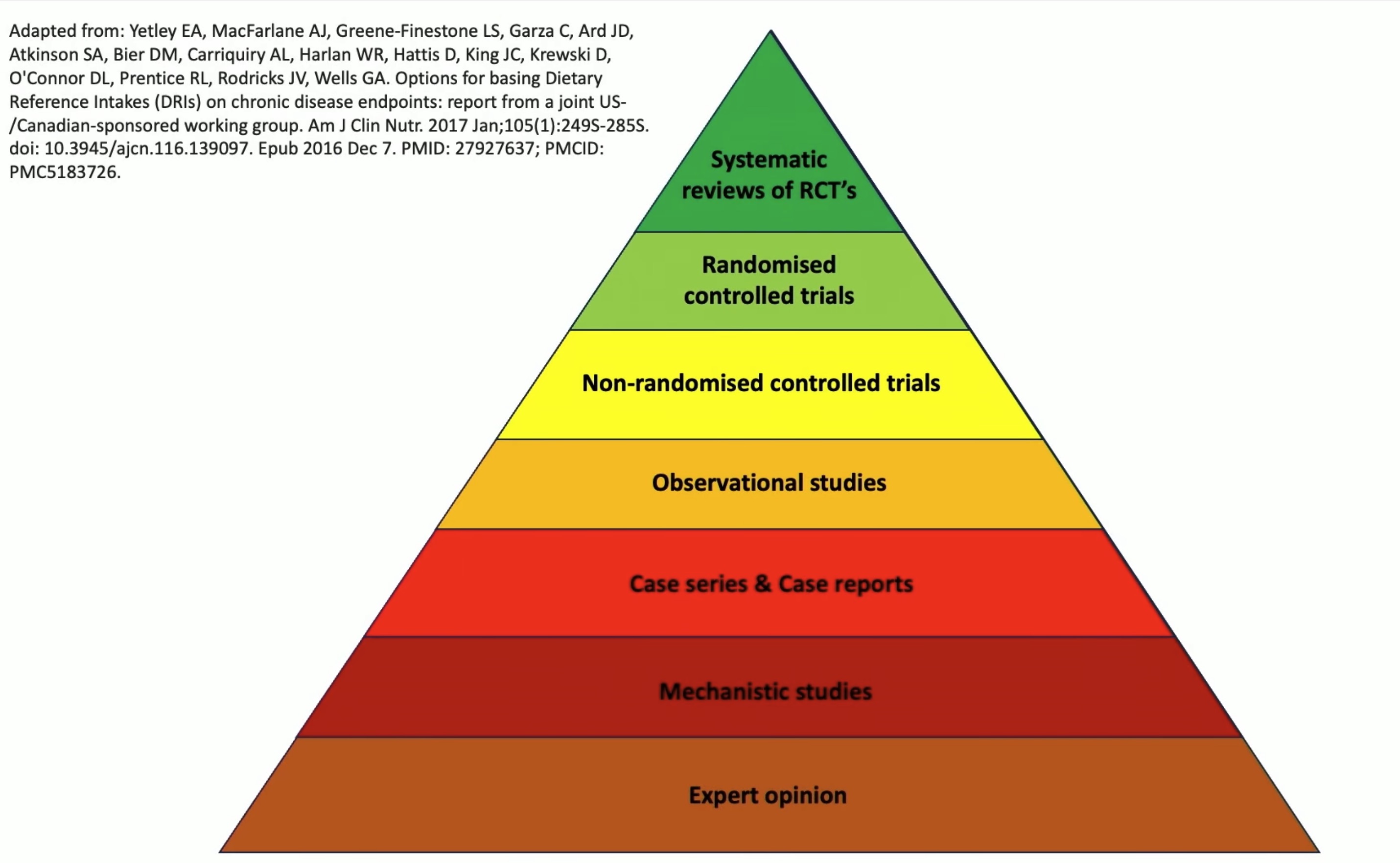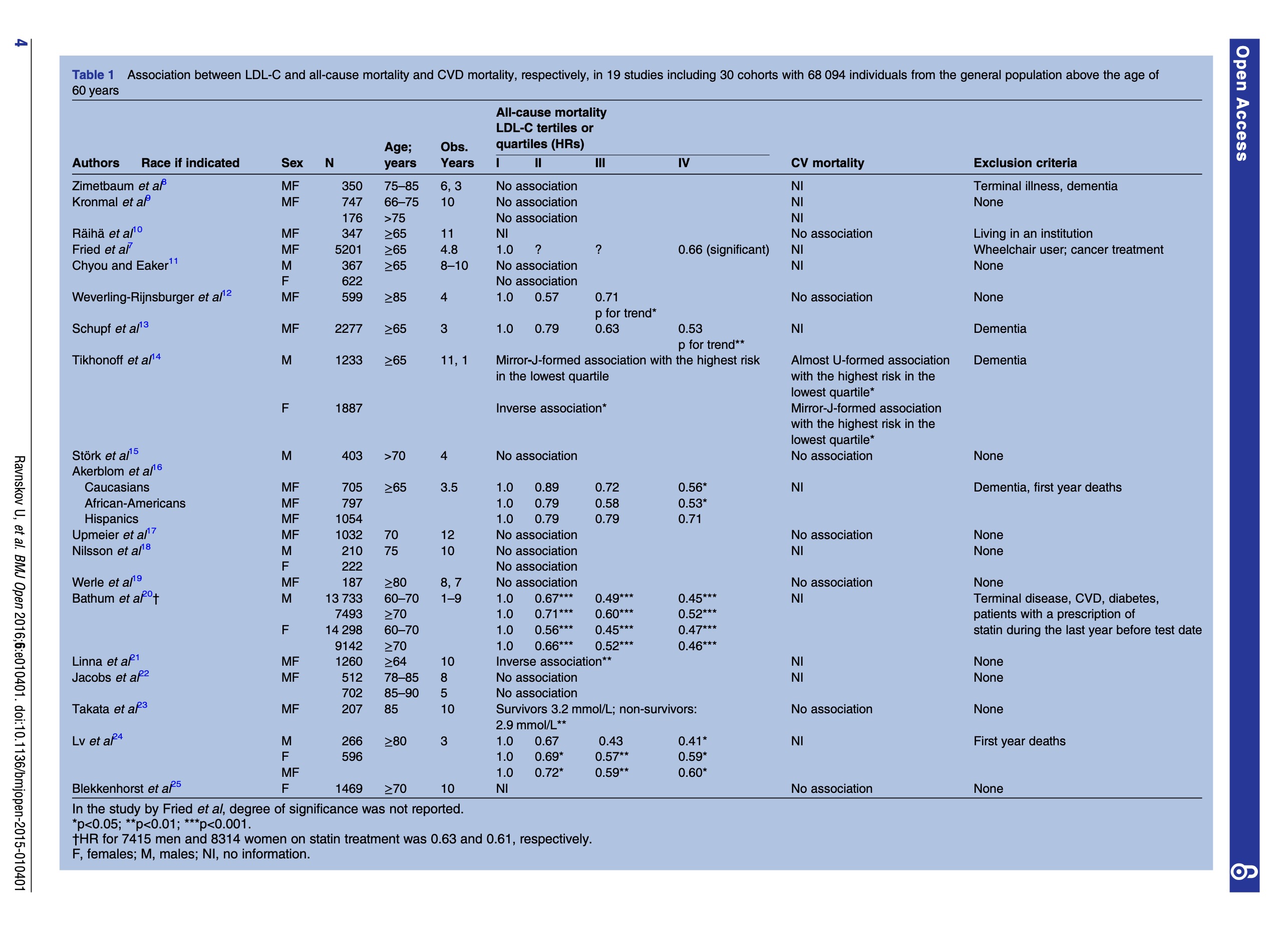Notes:
The bad cholesterol hypothesis is showing its age, and does not account for mortality data.
The great thing about looking at mortality and LDL measurements is its not a FFQ! So there is less debate about the reality of the study participants.
We identified 19 cohort studies including 30 cohorts with a total of 68 094 elderly people, where all-cause mortality was recorded in 28 cohorts and CV mortality in 9 cohorts.
Inverse association between all-cause mortality and LDL-C was seen in 16 cohorts (in 14 with statistical significance) representing 92% of the number of participants, where this association was recorded. In the rest, no association was found. In two cohorts, CV mortality was highest in the lowest LDL-C quartile and with statistical significance; in seven cohorts, no association was found.
LDL was seen as PROTECTIVE in 92% of the participants!!! In two studies low LDL was a risk factor for bad endpoints.
Some of the participants with high LDL-C may have started statin treatment during the observation period and, in this way, may have added a longer life to the group with high LDL-C and some of them may have started with a diet able to influence the risk of mortality
No study of unselected people has found an association between TC and degree of atherosclerosis.
in most of the Japanese epidemiological studies, high TC is not a risk factor for stroke, and further, there is an inverse association between TC and all-cause mortality, irrespective of age and sex
have chosen to focus on the association between LDL-C and all-cause and CVD mortality, because mortality has the least risk of bias among all outcome measures.
any beneficial effects of statins on mortality would have been minimal because most statin trials have had little effect on CVD and all-cause mortality, with a maximum reduction of mortality of two percentage points.
ha, thats a academic burn! Side eye on the RR trumpets for small real benefit.
In a recent study, the authors reported that among participants who were older than 65 at baseline, a 30 mg/dL decrease in serum cholesterol was associated with a higher risk of death (HR 1.35, 95% CI 1.18 to 1.54).
So LDL is protective (1.35 HR which is nothing, but the case against LDL is made with LOWER HRs)
this finding suggests that the conventional dietary treatment for high cholesterol with vegetable oil replacing saturated fat may actually increase mortality in those individuals with high LDL-C.
This makes sense, the body makes cholesterol to function, its necessary, a diet that attacks the functioning of cholesterol should have some negative impact on mortality.
Assessments of the association between serum cholesterol and mortality have been studied for decades, and extensive research has shown a weak association between total cholesterol and mortality in the elderly;everal studies have even shown an inverse association.
It is therefore surprising that there is an absence of a review of the literature on mortality and levels of LDL-C, which is routinely referred to as a causal agent in producing CVD 4 and is a target of pharmacological treatment of CVD.
I think this is a direct calling out of pharmacological corruption medicine, but said through a academic lens.
LDL binds to and inactivates a broad range of microorganisms and their toxic products.Diseases caused or aggravated by microorganisms may therefore occur more often in people with low cholesterol, as observed in many studies.
LDL are the firemen in our city, and they go where the fire is, you reduce the firemen your going to have a bad time.
Nine cohort studies including more than 140 000 individuals followed for 10–30 years have found an inverse association between cancer and TC measured at the start of the study, even after excluding deaths that occurred during the first 4 years.
Furthermore, cholesterol lowering experiments on rodents have resulted in cancer
Significantly more patients with cancer have been on cholesterol-lowering treatment.
In agreement with these findings, cancer mortality is significantly lower in individuals with familial hypercholesterolaemia
that LDL-C is lower than normal in patients with acute myocardial infarction
the main goal of prevention of disease is prolongation of life, all-cause mortality is the most important outcome, and is also the most easily defined outcome and least subject to bias.
The shade in this paper!
Conclusions: High LDL-C is inversely associated with mortality in most people over 60 years. This finding is inconsistent with the cholesterol hypothesis (ie, that cholesterol, particularly LDL-C, is inherently atherogenic). Since elderly people with high LDL-C live as long or longer than those with low LDL-C, our analysis provides reason to question the validity of the cholesterol hypothesis. Moreover, our study provides the rationale for a re-evaluation of guidelines recommending pharmacological reduction of LDL-C in the elderly as a component of cardiovascular disease prevention strategies. Summary:
Systematic Review of published cohorts, high value science.
evidence pyramid

.
